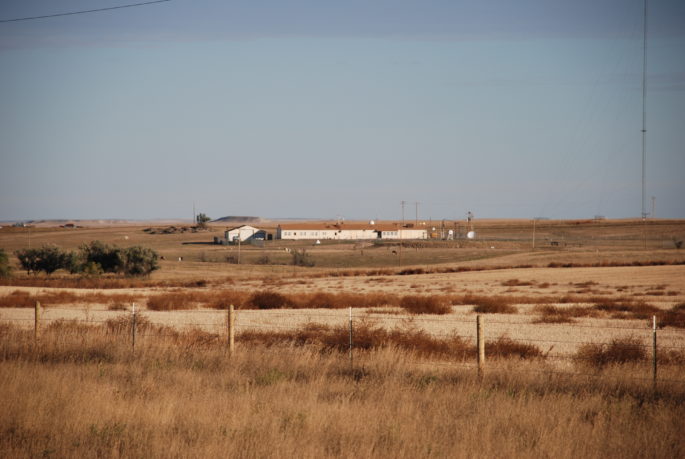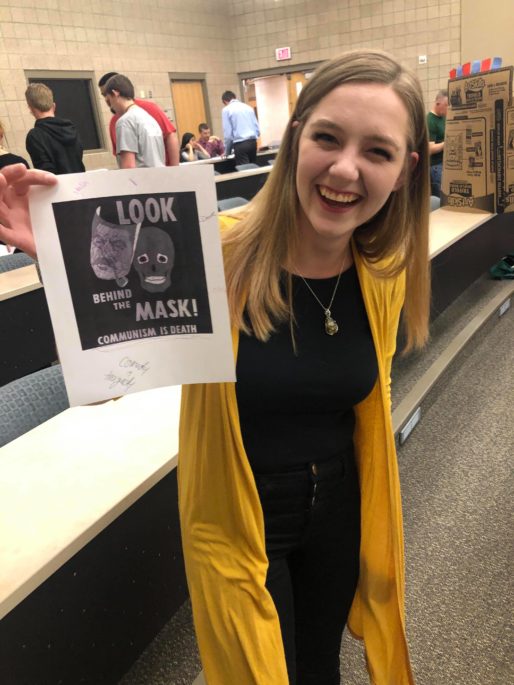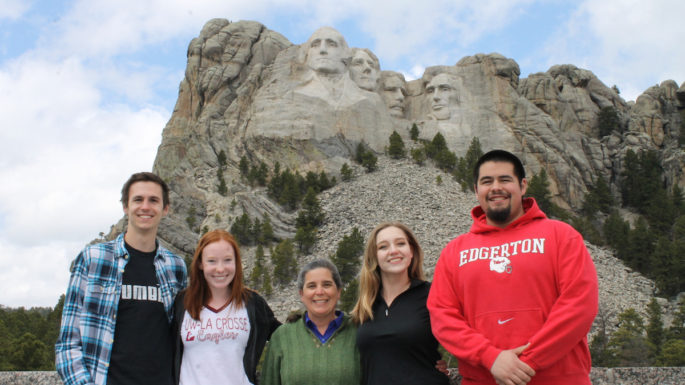Posted 11:15 a.m. Wednesday, May 29, 2019

Four education majors gain experience teaching Cold War social justice at historic South Dakota site.
Education majors gain experience teaching Cold War social justice at historic South Dakota site
UW-La Crosse instructor Mellissa Collum shows students that the walls of their future classrooms aren’t so fixed.
Their teaching skills can spark curiosity about the Cold War among Nebraska’s junior ROTC cadets or help young girls in Nepal with issues from mental health to hygiene.
“I share this with my students a great deal: We can use skills and knowledge to foster education and bring education from the world into our classrooms,” Collum says.
Teaching social justice at South Dakota historic site
In April, Collum led a group of four UWL education majors to a National Historic Site in South Dakota where they taught lessons about social justice issues related to the Cold War to Junior ROTC cadets. The Minuteman Missile National Historic Site was a profound place to teach Cold War history. It was the location of a vast arsenal of nuclear missiles hidden underground and on constant alert for 30 years.
“National parks are living classrooms to America's past,” says Eric Leonard, superintendent at the Minuteman Missile National Historic Site. “A project such as this provides real-time feedback on how the park is telling our story and what techniques or scholarship we could utilize to more effectively reach audiences."

The students aimed to provide cadets — sophomores through seniors in high school — with a broader understanding of the concepts of war, peace, and a challenging and complex time in world history.
Students had to research a specific topic related to social justice and the Cold War, and then prepare materials and determine how to teach it to a high school audience.

UWL student Katlyn Buika researched posters used by the U.S. during the Cold War and incorporated these into her lesson plans. The posters were used to manipulate minds during the war whether instilling fear, dehumanizing Russia or portraying America as weak. The class discussions about the posters helped unveil misconceptions, including the idea that America and its military can do no wrong, explains Buika.
The experience is one the UWL senior will never forget. She learned about a time in history that is not often mentioned, how to adapt lessons to diverse classrooms and teach social justice topics. She also now understands how to incorporate the National Park System into her future classroom whether physically traveling there or using online resources.
“I learned so much about our country, our military, and methodology that I will carry on to my future classrooms for years to come,” says Buika, who would eventually like to teach U.S. history in the Sparta School District.
Buika and other UWL students’ lessons will also be published by the National Parks System for use by educators worldwide.
Along the way, students were able to gain practice and self confidence in front of a classroom, making them stronger candidates when applying for teaching positions, notes Collum.
Some come away with even more than that.
Buika learned how to show her passion for education from Collum. “I am about to go into student teaching at Sparta High School next fall, and I cannot wait to inspire my students as Melissa has inspired me,” she says.

The South Dakota trip is just one way Collum has given students opportunities to learn through outreach. She spends summer breaks leading teams of evaluators to developing nations to assess schools and communities with the goal of growth in student educational matriculation and attainment. This summer she and Morgan Alexander, UWL Middle Childhood-Early Adolescence Education major, will travel to Nepal.
“I think any time we can get students out of the classroom and have them doing practical applications of their future profession, it provides a great opportunity for professional and personal growth,” says Collum.
Collaborative grant makes experiential learning possible
The South Dakota experience was made possible through a Junior ROTC Curriculum and Experiential Learning through National Parks grant. It is focused on engaging veterans (Junior Reserve Officer Training Corps instructors), university students, grade 9-12 students, and National Park personnel together in the study and analysis of military history. The group of UWL students are among 90 students nationally to work on the three-year grant.
The grant collaboration opportunity came out of UWL faculty Melissa Collum’s connection with Professor Maria Sanelli, of Kutztown University, who earned the grant.
Student participants and topics
Katlyn (Katie) Buika (Majors: Broadfield Social Studies and History Education Minors: French and Art) Lesson: Propaganda posters in the Cold War
Jesse Gilbertson: (Majors: Broadfield Social Studies and History Education) Lesson: Civilian Readiness for the "Bomb" and poverty of preparedness
Karlee Kirking (Majors: Middle Childhood-Early Adolescence and Spanish Education) Lesson: Breaking Barriers: Women "Missile men" at Minuteman: Breaking the Plain of the Earth to break sexual barriers
Adrian Radtke (Majors: Broadfield Social Studies and History Education) Lesson: Social Protests of the "Bomb and Military" in the Cold War.
